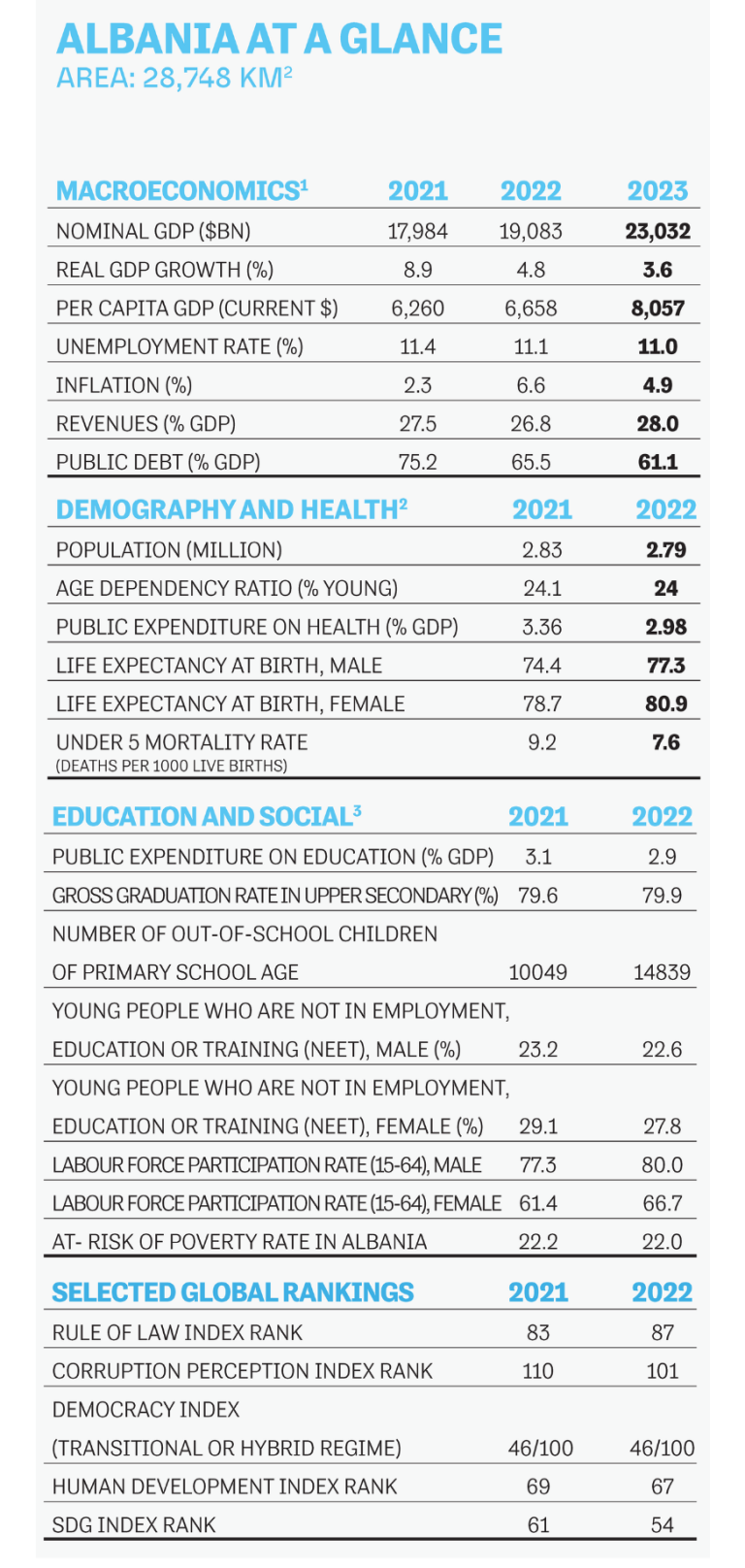Albania has proven its resilience over the last couple of years. Despite challenges posed by the triple shock of the earthquakes of 2019, the Covid-19 pandemic and the start of the war in Ukraine, the country has continued to show remarkable economic resilience and commitment to European Union (EU)-oriented reforms, and delivered tangible and sustainable results. A low inflation rate of 4.9 percent in 2023 is well below regional comparisons, while relatively strong real Gross Domestic Product (GDP) growth and forecasts at 3.6 percent and 3.8 percent in 2023 and 2024, respectively, are also favourable. Economic development gains were borne out in average salary increases, and large jumps in GDP per capita, from USD 6,260 in 2021 to USD 8,057 in 2023, a rise of 21 percent, are impressive. But less so when viewed in terms of real GDP per capita growth of 5.1 % in 2022 and 3.9 % in 2023. Government sought some redistribution impact from economic growth through legislated increases in minimum wages payable in all sectors, with the basic minimum wage increasing by 15 percent to 40,000 lek, and those for health and education staff by an average of 30 percent.

High nominal economic progress was driven by resilient private consumption, notably with strength in construction activity and tourism, an increase also in the number of foreign visitors by 40 percent compared to the year before, and some 4.5 million foreign visitors exploring Albania’s Protected Areas (PAs). However, income and wealth distribution continues to be a growing concern.
Monetary policy has been used well to support targeting of inflation and stable financial sector public finances held strong with higher than planned inflows and public debt remaining close to the target of 60 percent of GDP and decreasing, with plans to reach the target in 2024. However, high levels of informality in the labour market, youth unemployment, emigration, lack of structural transformation from lower to higher value-added economic activities, corruption and illicit financial flows and money laundering remain areas that will continue to require focus in 2024. Government is well positioned to address these challenges.

The 2023 Sustainable Development Report ranked Albania in the top one-third of countries globally (54th), jumping seven places. The National Strategy for Development and European Integration (NSDEI) 2022–2030 was prepared in consultation with all stakeholders and launched at the start of 2023. It has the potential to strengthen the interface between the socio-economic and environmental targets and overall governance reforms.
Albania is a significant player in multilateral organisations. It is a member of NATO, was elected to the UN Security Council for 2022–2023, presiding in September 2023, has co-sponsored and co-led several crucial initiatives on Ukraine, and is on a path towards EU accession. In its latest conclusions, adopted in December 2023, the European Council welcomed the progress of reforms the country has made in the past year, including the successful completion of screening meetings. As the next step in Albania’s accession process, the Council looks forward to opening the first negotiation cluster—covering chapters on judiciary, fundamental rights and justice—as soon as possible. The importance of Albania regionally is seen in the many high-level events it hosts: for the first time, and nine years after its launch in 2014, the Berlin Process Summit Meeting was held in Tirane on 16 October 2023.
1. IMF World Economic Outlook database: October 2023 and Article IV Consultations January 2024, UN DESA World Economic Situation and Prospects 2024 from January 2024
2. IMF World Economic Outlook database, INSTAT Albania in Figures 2022, INSTAT various databases 2024, UNICEF
3. IMF World Economic Outlook database, INSTAT Albania in Figures 2022, INSTAT various databases 2024, UNICEF

